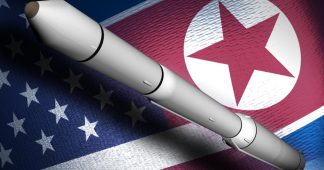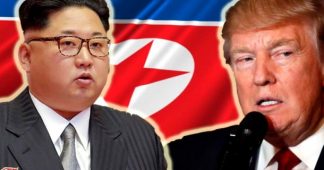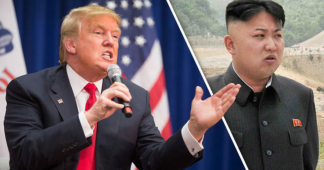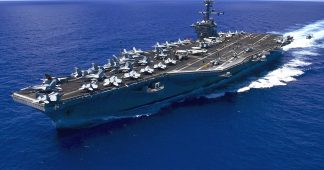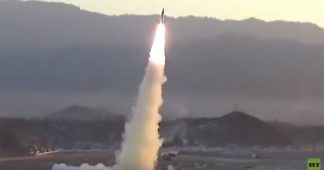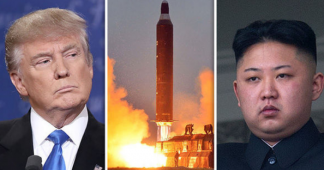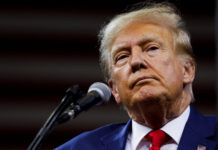Trump is miscalculating badly with China and North Korea and is risking war – Here’s why
By Alexander Mercouris
The President thinks he can bluff the Chinese and an attack on North Korea will have only limited consequences. He is wrong on both counts.
As the US navy steams towards the Korean peninsula, North Korea threatens counter-attacks on US bases and on South Korea, and as China warns of war, the unanswered question is whether there is any real strategy behind these moves.
US carrier deployments near the Korean peninsula are hardly new whilst US threats to take unilateral action against North Korea have been made many times before. It is known that the Clinton, George W. Bush and Obama administrations all seriously considered pre-emptive strikes on North Korea, with the Clinton administration in 1994 coming closest. All three previous administrations however in the end pulled back when they assessed that the possible consequences might be a war which would ravage the Korean Peninsula.
In the case of the Clinton administration, the assessment was that possible North Korean retaliation could involve massive artillery strikes against South Korea’s capital Seoul, which might cause up to a million casualties. That looks wildly exaggerated. However since then Seoul has grown in size, more suburbs have been built closer to the North Korean border (bringing them within closer range of North Korea’s artillery) and North Korea has acquired nuclear weapons and (possibly) the means to use them. What may have been an exaggeration in 1994 might no longer be so now.
Beyond that there is huge uncertainty as to what exactly the US would strike if it did attack. The North Korean nuclear programme is known to be heavily defended and widely dispersed, with many of the facilities buried deep underground. A limited cruise missile strike such as the one the US has just launched in Syria would achieve nothing that would justify provoking the probably strong North Korean reaction. By contrast a full-scale attack on North Korea – which is now a nuclear power – would risk an all-out war on the Korean Peninsula, which would be potentially devastating, and which given North Korean missile capabilities might conceivably even spread as far as Japan.
On any rational calculation a US military strike against North Korea makes no sense, and under any other administration one would be inclined to rule the possibility out, and to dismiss the latest US moves as empty bluff.
The reason it is now impossible to do this is not because anything in the Korean Peninsula has changed since previous administrations considered and then rejected the option of military action, but because following the US missile attack on Syria no-one any longer can be sure that the foreign policy decisions of this President and of this administration are being made in an orderly and rational way. Instead it seems policy is being driven far too much by impulse and by concerns about ‘face’, with the President making decisions on the fly, with his advisers unwilling or unable to restrain him.
To the extent that it is possible to see a strategy behind the latest US moves, it seems to be to frighten the Chinese into abandoning North Korea by threatening them with a war in the Korean Peninsula if they don’t, with a big trade deal thrown in as a sweetener.
This is the sort of approach that might make sense in the cut-and-thrust US property industry which Donald Trump knows. However the trouble with this frankly amateur approach is that it gravely underestimates the strength of feeling in China.
Whilst it is doubtful that most Chinese think or care much about North Korea, the Chinese leadership would face a severe internal crisis if it appeared to back down in the face of US threats. An actual or pending US attack on North Korea would therefore be far more likely to strengthen Chinese support for North Korea than to weaken it.
The President and his advisers made the same mistake following the US missile strike on Syria. In the days following the missile strike the President and his advisers appear to have believed – and were encouraged by the British to believe – that the missile strikes would cause the Russians to reduce their support for Syria’s President Assad. As with the bribe of the big trade deal they are now offering China, they also offered the Russians the prospect of better relations with the US to sweeten the deal.
In the event the Russians were neither intimidated by the missile strike nor impressed by the bribe. Instead, rather than pulling out of Syria or reducing their support for President Assad, their response was to increase it.
There is no reason to think the Chinese response to any US attack on North Korea would be any different. On the contrary, given traditional Chinese sensitivity about questions of prestige, a hardening of China’s position in the face of US ‘aggression’ on the Asian mainland is a virtual certainty.
The trouble is that having allowed tensions to ratchet up to this level the President may feel he cannot pull back without being humiliated, and given his own over-sensitivity about ‘face’ and the inability of his key foreign policy aides – Mattis, McMaster and Kushner – to restrain him (Tillerson seems to be barely in the loop) the potential consequences of that are alarming, to say the least.
It is however desperately important in this situation that the President either comes to his senses and accepts whatever face-saving proposal the Chinese put to him – however empty of content it may be – or that his advisers finally stand up to him and restrain him. A failure to do so could set the scene for catastrophe, either now or in the future
The alternative, however humiliating, would at least teach this inexperienced President and his advisers that the first law of international relations is never to bluff China, because it is a bluff which is always called.
